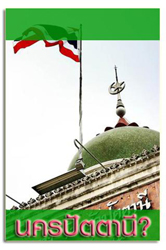Nakhon Pattani: A tangible dream or a cause of confusion?
 The conceptual modality of a new administrative body for the three southernmost provinces widely known as Nakhon Pattani or the City of Pattani was the subject of a public forum held on Constitution Day December 10 at the Pattani campus of Prince of Songkhla University.
The conceptual modality of a new administrative body for the three southernmost provinces widely known as Nakhon Pattani or the City of Pattani was the subject of a public forum held on Constitution Day December 10 at the Pattani campus of Prince of Songkhla University.
The forum, titled “Nakhon Pattani under the Thai Constittution: A tangible dream?” was organized by a network of 23 civic groups in Pattani, Yala and Narathiwat provinces. It was an extension of the forum, titled Nakhon Pattani under the Thai Constitution: Is it real or just a dream?” held exactly one year ago, also at the same venue.
In Pattani where the forum was held, several huge billboards featuring the picture of General Chavalit Yongchaiyudh, chairman of the Puea Thai party, with a statement “Nusandara…Nakhon Pattani” were put up at main road intersections in the three southernmost provinces. The general himself has been a strong advocate for the proposed new administrative body.
Pol Maj-Gen Chamroon Den-udom, head of the network of 23 civic groups, claimed that the last forum on the same subject received a lot of interest from people in the region to the extent that the network had asked King Prachadhipok Institute to get feedbacks about the Nakhon Pattani idea from people in the three southernmost provinces. 47 forums were held by the institute to gauge the views of the people.
Out come of the opinion survey conducted by the King Prachadhipok Institute was also presented at the forum on December 10.
Dr Chaiyant Chaiyaporn, a lecturer at the Faculty of Political Science of Chulalongkorn University, delivered a keynote speech on “The Rights of the People under Democratic System”. In a part of the speech, he likened democratic system to a sheet of cloth stitched together with colourful pieces of cloth. “Everyone is a human being before being a citizen of a country and although everyone has different skills, he or she must have civil wisdom,” said Dr Chaiyant.
After the speech, a summary report on public opinions about Nakhon Pattani undertaken by King Prachadhipok Institute was presented to the forum.
The opinions aired were summed up into eight points as follows:
- The proposed new administrative body must conform with Ariticle 1 of the Constitution – that is Thailand is one and indivisible kingdom.
- The proposed new administrative body must bring about political justice in a way that every stakeholder feels that he or she is part and parcel of the Thai society and the voice of the majority must be heeded with the voice of the minority not ignored.
- The top administrator must be a local resident and the number of Thai Buddhist and Thai-Muslim bureaucrats must be in proportion with their populations in the region. The top administrator and the officials must understand the way of life, culture and aspirations of the local people.
- There must be a mechanism conducive to public participation in decision-making, initiating ideas or making recommendations on policy matters, monitoring and evaluating the performance of local administrators.
- There must be a screening process in the selection of the administrators or members of the local councils to reduce rivalry among people in the localities.
- All official signboards must bear names in Thai and Malay languages.
- Education system must follow the standard set by the Education Ministry and correspond with the needs and identities of the localities. The teach of Malay language in government-run schools must be done in a way that parents of different religious faiths and cultures feel comfortable to send their children to the schools.
- Enforcement of Islamic law with Muslim people especially the law on family and inheritance. Amidst the widespread publicity and debate on the Nakhon Pattani concept, Mr Areepen Utarasin, a veteran MP of Narathiwat, voiced his strong objection to the concept. He claimed that most people in the three southernmost provinces did not want Nakhon Pattani which, he said, was the wish of a handful of people.
Amidst the widespread publicity and debate on the Nakhon Pattani concept, Mr Areepen Utarasin, a veteran MP of Narathiwat, voiced his strong objection to the concept. He claimed that most people in the three southernmost provinces did not want Nakhon Pattani which, he said, was the wish of a handful of people.
“I have been living in the region for a long time and have been an MP for decades. I have asked the opinions of many people in the region and found out that they want only three things: better quality of life; safety in lives and their properties; and justice,” said Mr Areepen.
He also warned that if proponents and supporters of the Nakhon Pattani idea pushed too hard on the matter, people in the rest of the country might rise up to protest against it.
Citing for example that a candidate has to spend 20-30 million baht each to compete for a seat as the chair of the provincial administration organization, the veteran MP of Matipoom party predicted that a candidate for the governor of Nakhon Pattani might have to spend 60 million baht each to vy for the seat.
In the end, he said the governorship post would end up in the hands of a rich businessman or an influential figure.
He also questioned why the name of Nakhon Pattani and why not Nakhon Narathiwat or Nakhon Yala. He claimed that Yala and Narathiwat also had its long history dating back to hundreds of years.
Nakhon Pattani is a sensitive issue for people in the region and elsewhere. Push the idea too hard will only cause confusion and provoke protest, he warned.
